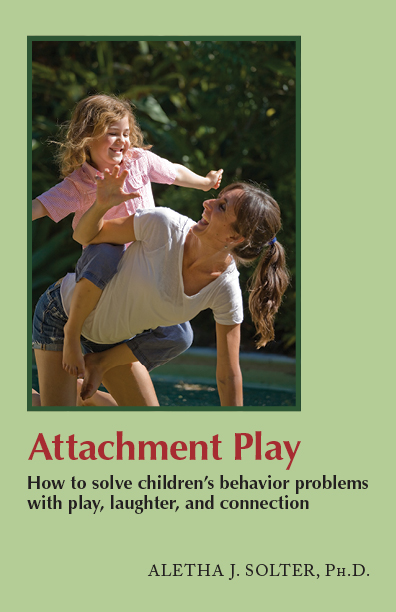My daughter is a dawdler
by Aletha Solter, Ph.D.
Question:
I am a working mother with a four-and-a-half year-old daughter who loves to dawdle in the morning when we are getting ready for work. No matter what time we get up in the morning (six or seven o'clock), she doesn't seem to want to work within the time frame we have before leaving home at eight o'clock. I have tried several approaches to solving this matter, such as drawing pictures of a morning routine to playing a beat-the-clock game. She goes to bed every night between eight and eight-thirty, so I don't believe that she is tired. However she moves only as quickly as she wants. She is a very bright child and very independent, so it is difficult for me to intervene with her getting dressed. (I do break down occasionally and get her dressed). We have also tried explaining in the simplest terms how schedules work, and how they are connected to our everyday routines. We are very much aware that children are great at dawdling, but this has caused some stressful mornings for us more often than not, and I am looking for some advice on how this can be resolved so that we are all happier in the mornings and not late. Thank you.
Answer:
Parents frequently ask this question at my workshops. There are several possible reasons why children dawdle. First of all, young children do not have the same sense of time as adults. It is hard for them to be efficient and organized enough to meet a time deadline. You can help things go more quickly by having your daughter select clothing to wear the evening before. She can also choose her breakfast menu and perhaps even help set the table for breakfast before going to bed.
Your explanations and playful approaches sound wonderful! Keep trying to make things fun for her. For example, you can play alphabet toilet ("Let's see if you can go to the toilet before the end of the alphabet") or getting dressed to a tune ("Let's see if you can get dressed while we sing all the verses of 'Mary had a little lamb.'"). If you play these games, you can slow down a little as needed, so that she always "wins" by finishing before the song is over. When children can feel that there is some fun in an activity, they are usually more willing to cooperate.
However, dawdling can be an indication of deeper problems. For example, children whose parents are authoritarian often use dawdling as a form of passive resistance. When parents try to control children with punishments or rewards, the children feel powerless, and one of their only ways of maintaining a sense of control is by dawdling. The solution in this case would be to strive for non-authoritarian approaches to discipline.
Even in a non-authoritarian home, dawdling can be a child's way of communicating a problem. Perhaps this is your daughter's way of resisting a school or daycare setting that is stressful for her. Maybe there is a teacher that is too harsh, or there are some ongoing social problems with other children. This would be worth checking into. Another possibility is that she is using dawdling as a way of being with you longer because she feels that she doesn't have enough time with you.
I suggest that you discuss this problem with your daughter at a time when you are not rushed or angry (perhaps on the weekend). You can say, "We have a problem every morning. I need to get to work on time, but you take a long time to get ready. I end up nagging you and I don't enjoy this at all. Do you have any ideas about what we can do to make mornings go better for both of us? How would you like it to be?" The idea is to engage her in the problem-solving process so her needs become clearer and so she can help arrive at a mutually agreeable solution.
If you open up communication this way, your daughter may reveal her deeper motives for dawdling, if there are any. If she doesn't offer any clues, you can ask questions, such as: "Is there something about your school that bothers you?" or "Would you like to spend more time with me?" Once your daughter's needs are clear, you may then be able to work out an agreement. For example, perhaps she needs time for closeness in the morning before getting dressed. If so, you can negotiate a mutually agreeable solution with her. An example of a solution might be that you will agree to spend fifteen minutes every morning cuddling with her and reading to her, and she will agree to get dressed and eat breakfast quickly after that so you can all leave on time. You can try your solution for a week to see how it goes, and re-evaluate it after that, revising it as needed. Children are usually willing to cooperate if they feel that their needs are being met and if they can have some input in the rules and routines.
Good luck!
About Aletha Solter:
Aletha Solter, PhD, is a developmental psychologist, international speaker, consultant, and founder of the Aware Parenting Institute. Her books have been translated into many languages, and she is recognized internationally as an expert on attachment, trauma, and non-punitive discipline.
Aware Parenting is a philosophy of child-rearing that has the potential to change the world. Based on cutting-edge research and insights in child development, Aware Parenting questions most traditional assumptions about raising children, and proposes a new approach that can profoundly shift a parent's relationship with his or her child. Parents who follow this approach raise children who are bright, compassionate, competent, nonviolent, and drug free.

